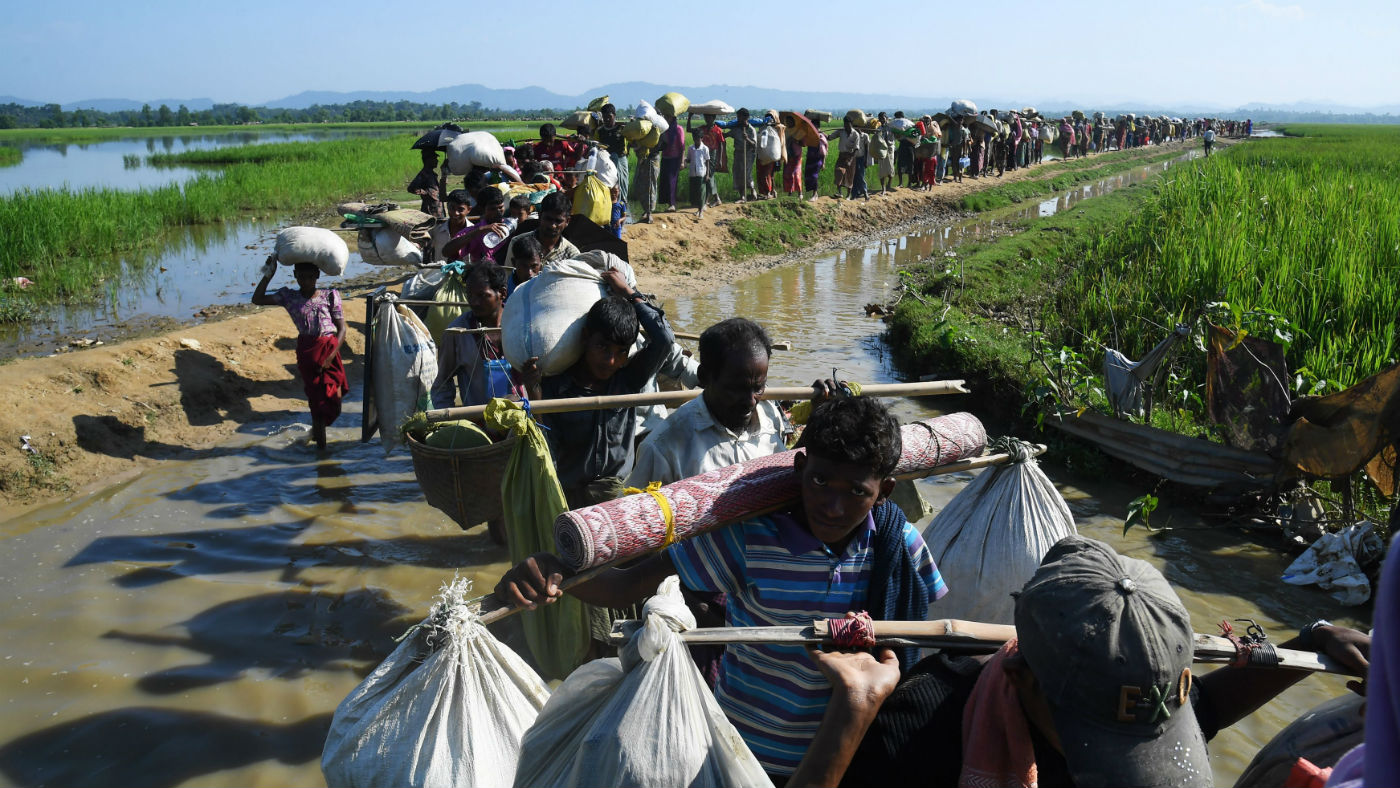Bangladesh closes door to Rohingya refugees
Foreign secretary accuses Myanmar of ‘hollow promises’ on repatriation

A free daily email with the biggest news stories of the day – and the best features from TheWeek.com
You are now subscribed
Your newsletter sign-up was successful
Bangladesh has said that it will no longer take in Rohingya Muslims fleeing persecution in Myanmar until some of the existing refugee population can be persuaded to return.
Addressing the United Nations Security Council yesterday, Foreign Secretary Shahidul Haque stressed the “the socio-economic and environmental impacts Bangladesh is facing for sheltering the displaced Rohingyas”, reports Dhaka-based newspaper The Daily Star.
More than 700,000 Rohingya Muslims have sought refuge in Bangladesh since August 2017, when the Burmese military launched a crackdown on the Muslim minority in Rakhine state.
The Week
Escape your echo chamber. Get the facts behind the news, plus analysis from multiple perspectives.

Sign up for The Week's Free Newsletters
From our morning news briefing to a weekly Good News Newsletter, get the best of The Week delivered directly to your inbox.
From our morning news briefing to a weekly Good News Newsletter, get the best of The Week delivered directly to your inbox.
The operations are officially aimed at insurgent groups in the region, but reports of indiscriminate violence against civilians - including murder, rape and the burning of Rohingya villages - have been rife.
Last year, estimates of 10,000 civilian deaths were described as “conservative” by the chair of the UN’s Independent International Fact‑Finding Mission on Myanmar, Marzuki Darusman, who called the situation a genocide.
In October, the governments of Myanmar and Bangladesh agreed a deal to begin repatriation of willing Rohingya refugees to Rakhine, despite a UN warning that conditions in the province were not yet safe.
Bangladesh had initially welcomed the refugees, but “a year on, their presence has become a politically contentious issue”, with “increasing pressure on [prime minister Sheikh] Hasina to start their repatriation as soon as possible”, The Guardian reported when the deal was announced.
A free daily email with the biggest news stories of the day – and the best features from TheWeek.com
But yesterday Haque said that almost no progress had been made, and questioned the sincerity of Myanmar’s commitment to reintegrating the Rohingya population. Haque accused Burmese officials of “hollow promises and various obstructionist approaches”.
“The Rohingya say they want guarantees over their safety and to be recognised as citizens before returning,” Reuters reports.
Haque told fellow council members that Myanmar’s ambivalence on these issues was reflected in the glacial pace of the repatriation project.
“Not a single Rohingya has volunteered to return to Rakhine due to the absence of conducive environment there,” he said.
“We don’t want anything except a safe, dignified, voluntary and sustainable return of the Rohingyas to Myanmar. We expect the Security Council’s supervision to solve the crisis.”
Western nations on the 15-member council are pointing the finger of blame squarely at the Burmese government, and have repeated calls for UN officials to be granted full access to Rakhine in order to better assess the situation on the ground.
The UK’s ambassador to the UN, Karen Pierce, said the UK was “very disappointed” at the lack of progress, adding: “And that obviously includes creating the conditions where the refugees feel able to go back.”
“The scale of what has been done to the Rohingya Muslims and the allegations of crimes against humanity really mark this out as one of the most terrible events of this century so far,” Pierce said.
Meanwhile, China, an ally of Myanmar, refused to pass judgement on what it described as an issue between neighbours. “It is up to the two countries to work out a solution,” said Chinese Deputy Ambassador Wu Haitao.
-
 The environmental cost of GLP-1s
The environmental cost of GLP-1sThe explainer Producing the drugs is a dirty process
-
 Nuuk becomes ground zero for Greenland’s diplomatic straits
Nuuk becomes ground zero for Greenland’s diplomatic straitsIN THE SPOTLIGHT A flurry of new consular activity in Nuuk shows how important Greenland has become to Europeans’ anxiety about American imperialism
-
 ‘This is something that happens all too often’
‘This is something that happens all too often’Instant Opinion Opinion, comment and editorials of the day
-
 Epstein files topple law CEO, roil UK government
Epstein files topple law CEO, roil UK governmentSpeed Read Peter Mandelson, Britain’s former ambassador to the US, is caught up in the scandal
-
 Iran and US prepare to meet after skirmishes
Iran and US prepare to meet after skirmishesSpeed Read The incident comes amid heightened tensions in the Middle East
-
 Israel retrieves final hostage’s body from Gaza
Israel retrieves final hostage’s body from GazaSpeed Read The 24-year-old police officer was killed during the initial Hamas attack
-
 China’s Xi targets top general in growing purge
China’s Xi targets top general in growing purgeSpeed Read Zhang Youxia is being investigated over ‘grave violations’ of the law
-
 Panama and Canada are negotiating over a crucial copper mine
Panama and Canada are negotiating over a crucial copper mineIn the Spotlight Panama is set to make a final decision on the mine this summer
-
 Why Greenland’s natural resources are nearly impossible to mine
Why Greenland’s natural resources are nearly impossible to mineThe Explainer The country’s natural landscape makes the task extremely difficult
-
 Iran cuts internet as protests escalate
Iran cuts internet as protests escalateSpeed Reada Government buildings across the country have been set on fire
-
 US nabs ‘shadow’ tanker claimed by Russia
US nabs ‘shadow’ tanker claimed by RussiaSpeed Read The ship was one of two vessels seized by the US military